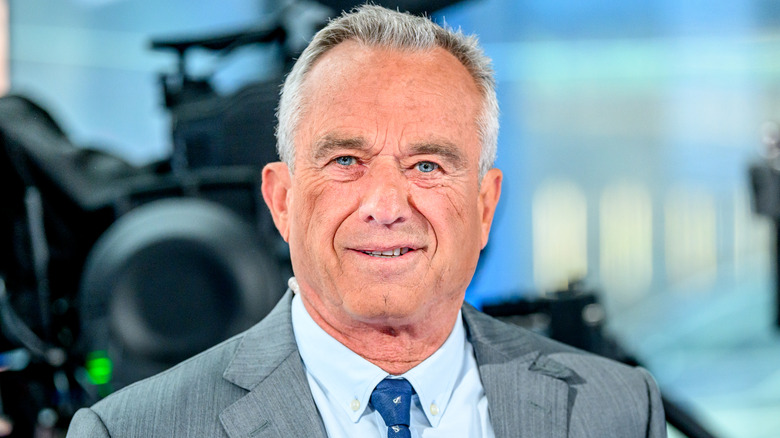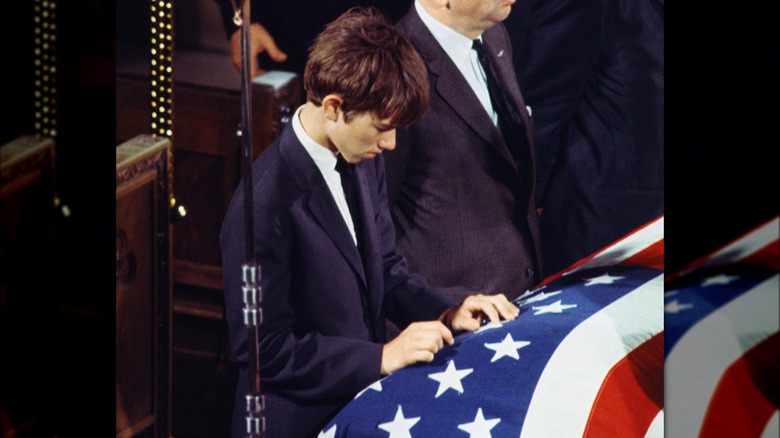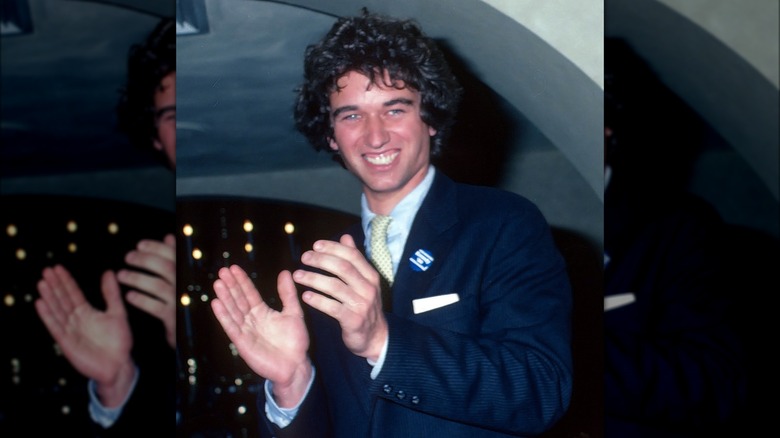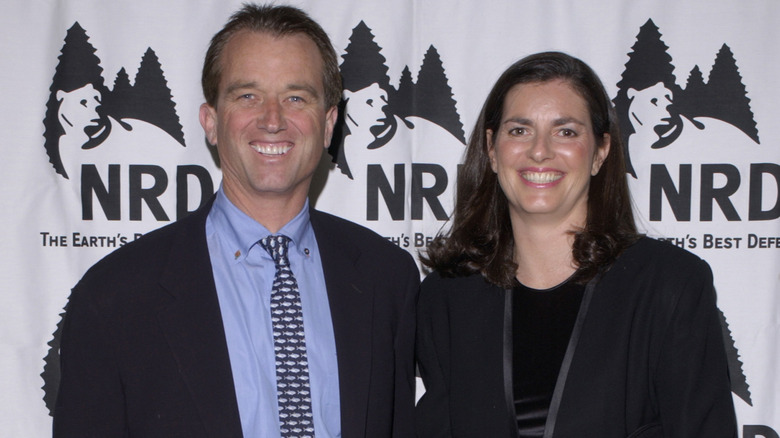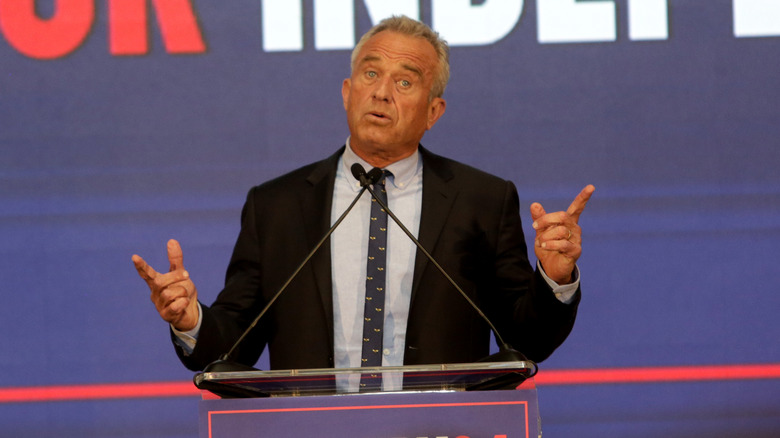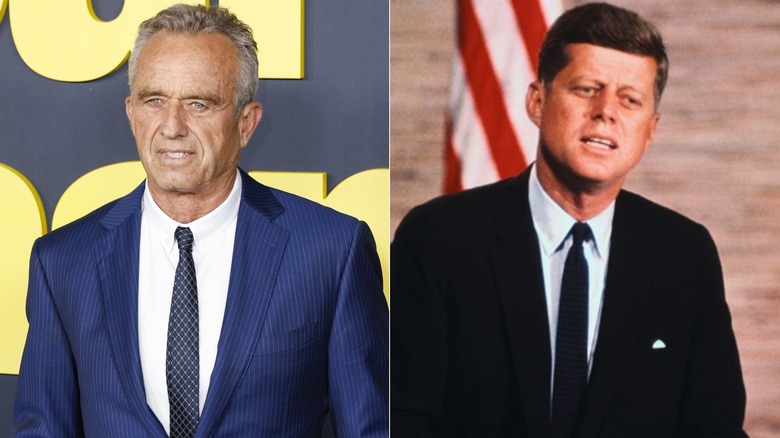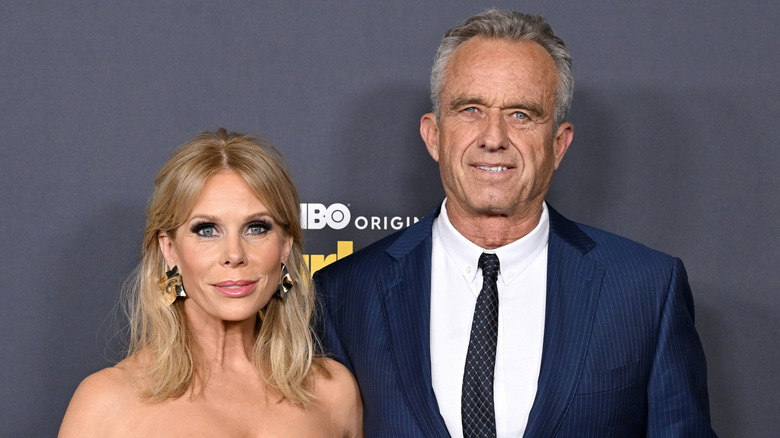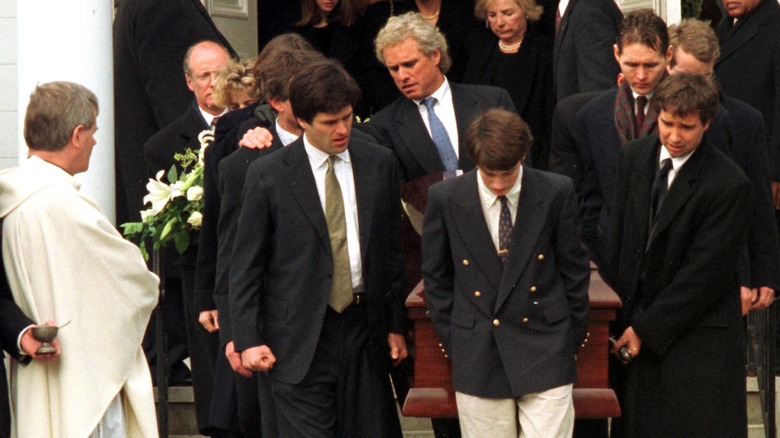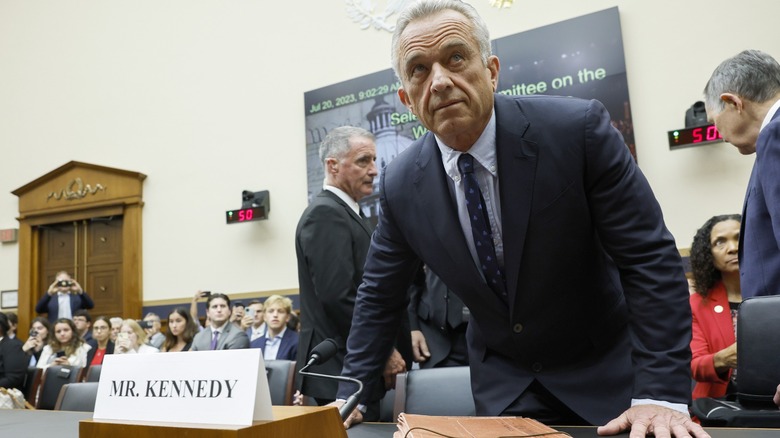The Tragic Truth About Robert F. Kennedy Jr.
This article includes mention of addiction and suicide.
Robert F. Kennedy Jr. is known for making headlines for all the wrong reasons. Whether it be his stance on vaccines, his political beliefs, or even his 2024 Super Bowl ad, the shady side of RFK Jr. has received plenty of attention and media coverage. Indeed, the son of Robert F. Kennedy and Ethel Kennedy has publicly backed some seriously outlandish conspiracy theories (like when he suggested mass shootings were a result of prescription drug use) and garnered so much backlash that he has even been banned from Instagram.
Yet, there are two sides to every coin. The environmental lawyer and 2024 presidential hopeful may be a controversial figure, but he has also experienced plenty of hardship in his life; including his rocky personal life, his years-long battle with addiction, and the rare illness that has taken his voice away. As a Kennedy, RFK Jr. comes from a family that has been plagued by loss and tragedy, and the aspiring politician has been impacted by much of it firsthand.
Robert F. Kennedy Jr. was 14 when his father was assassinated
Robert F. Kennedy was poised to follow in his brother's presidential footsteps when, on June 6, 1968, his life was cut short. Just five years after JFK's assassination, the former U.S. attorney general and New York state senator was shot and killed at age 42. He had just won the California presidential primary and decided to give a speech in the ballroom of Los Angeles' Ambassador Hotel. After thanking supporters, he exited through the hotel's kitchen, where he was fatally shot by 24-year-old Sirhan Sirhan. RFK died the following day, and while accounts of the assassination varied, Sirhan was ultimately sentenced to life in prison.
RFK Jr. was just 14 at the time and shared a strong bond with his dad. "He was a wonderful, attentive father," he recalled to Vatican News. Rather than grieving openly, he told Sky News Australia that he was taught to never complain and he internalized the heartbreak. As he revealed to Oprah Winfrey in 2007 (via the New York Post), that may have triggered his downward spiral into addiction. "Pretty soon after my dad died, I started taking drugs," he explained.
Decades later, he still thinks about his father. In fact, he has continued to analyze that fatal day. In 2018, he called for a new investigation into the murder. "It's hard to believe that Sirhan shot my dad," he told CBS News, explaining that while Sirhan was facing RFK, "all the four shots that hit my father came from behind him."
RFK Jr. believes his addiction was genetically hardwired
Just months after his father's death, 15-year-old Robert F. Kennedy Jr. began using heroin. While he explained to GBNews that he didn't like to draw a straight line from the assassination to his addiction — "I wouldn't blame drugs on those tragedies," he said – substance abuse has been found to be a response to traumatic events.
Whatever the cause, he found solace in substance abuse. "The drugs, it turned out, helped me sit still and focus," he wrote in his 2018 memoir, "American Values: Lessons I Learned From My Family" (via Radar). Over the next 14 years, RFK Jr. would experiment with different drugs and also turn to alcohol. While he made a conscious effort to quit, nothing seemed to work. "I believe that I am genetically hardwired to drink and drug myself to death," he wrote. Similarly, he told GBNews, "I feel like I was born an addict and I was born with, like, an empty space inside of me."
His last option was a 12-step program, but he was hesitant to expose his struggle and tarnish his family's name. "It would have seemed insane to go into a group of strangers and start talking about anything private," he shared, noting he was sure it would immediately land in the papers. "The consequences for doing something like that in my position seemed ... cataclysmic." It wasn't until he was 28 that he finally pushed aside those worries and made his health a priority, getting sober thanks to a 12-step program.
He was blamed for his ex-wife's death
Robert F. Kennedy Jr. first met his second wife, Mary Richardson Kennedy, when she befriended his younger sister, Kerry, at boarding school. Nothing came of their acquaintanceship until years later when RFK Jr. filed for divorce in 1994 from his first wife, Emily Black. In a future affidavit (via the Los Angeles Times), RFK Jr. recounted their love story, saying he "fell deeply in love with Mary in 1993."
The couple married in 1994 and had four children together, but the whirlwind romance soon turned dark. Mary reportedly struggled with mental health and addiction, and RFK Jr. filed for divorce in 2010, accusing her of often being intoxicated and threatening suicide in front of their kids. Their split was still pending in 2012 when Mary died by suicide
Friends soon blamed RFK Jr. for the tragedy. One told the New York Post Mary turned to prescription drugs and alcohol to cope with her husband's infidelity and eventual divorce. "She was used up and tossed away by Bobby," they posited. Another source claimed to Radar Online, "She was concerned that Robert was about to substantially reduce the amount of financial support he gave her and she was terrified she would have to file for bankruptcy and lose her home." For his part, RFK Jr. boldly addressed the claims in a eulogy at Mary's funeral, saying (via the New York Post), "I know I did everything I could to help her."
RFK Jr. was diagnosed with a rare neurological disorder
When Robert F. Kennedy Jr. appeared on "Larry King Live" in 2008, viewers had one pressing question: What happened to RFK Jr.'s voice? While he didn't initially respond to ABC News' request for comment, he eventually confirmed that he was diagnosed with spasmodic dysphonia.
Spasmodic dysphonia is a rare neurological disorder that causes spasms in the muscles used to generate the voice, thus affecting a person's ability to speak, as Mount Sinai explained. Only about 50,000 people in North America are affected, and there is no known cure. It's so rare, in fact, that when RFK Jr.'s voice first began to tremble, he didn't know what was happening. It wasn't until he saw a doctor in 1996 and was officially diagnosed at age 42.
In addition to struggling with the physical aspects of the disorder (some days, he would lose his voice completely), RFK Jr. believes it has impacted his career. "I think it makes it problematical for people to listen to me," he said in a 2023 NewsNation town hall, noting, "I cannot listen to myself on TV." That pushed him to try various experimental treatments, including a novel procedure in Japan, which he said made a huge difference. "I got a surgery on my vocal cords where they put a titanium bridge in, and it helped a lot," he told News 12 Long Island in 2023.
He can't let JFK's assassination go
Robert F. Kennedy Jr. hasn't stopped parsing through the evidence surrounding his father's assassination, and he similarly can't let go of his uncle, John F. Kennedy's, murder. When JFK was shot and killed in Dallas, Texas on November 22, 1963, it rocked the nation and the world and left his family shattered. The loss was particularly tough on his brother, Robert F. Kennedy.
Speaking at a 2013 event marking the 50th anniversary of the president's death, RFK Jr. opened up about the impact that day had on his father. He told listeners, per NBC News, that his dad spent an entire year reading books by various philosophers, poets, and scholars, as he tried to come to terms with JFK's tragic death. "[He was] trying to figure out kind of the existential implications of why a just God would allow injustice to happen of the magnitude he was seeing," RFK Jr., who was just 9 at the time, recalled.
As if mourning the loss of his uncle and watching his dad struggle weren't enough, the young RFK Jr. soon became obsessed with figuring out what really happened that day. While Lee Harvey Oswald was sentenced for the crime, RFK was convinced the CIA was involved. "It was my father's first instinct that the agency had killed his brother," RFK Jr. told Fox News in 2023. It's a thread he himself has since picked up, studying endless documents in an effort to prove his father's hunch was right.
RFK Jr. wanted to fake divorce for a sad reason
In 2014, Robert F. Kennedy Jr. said "I do" for the third time when he married actor Cheryl Hines. Yes, their union may be strange, but it works. Despite RFK's many headline-making controversies, Hines has stood by him, even backing his 2024 presidential run. She has been mocked and ridiculed by fans because of it, yet she told The Hollywood Reporter in 2024 that anyone calling her husband a conspiracy theorist was missing the point. "I would think that you would see the world through a different lens if you saw your uncle be assassinated, then your father," she argued.
Clearly, they share a strong bond, and it's this deep love that drove RFK Jr. to offer Hines a fake divorce. This idea materialized after a 2022 anti-vaccine rally in Washington, D.C., during which RFK Jr. suggested that America had become more restrictive than Nazi-occupied Europe due to its COVID-19 restrictions and vaccine mandates. The backlash was swift, and the aspiring politician came up with a bold plan to spare his wife.
"I saw how it was affecting her life and I said to her, 'We should just announce that we are separated,' so that you can have some distance from me," he told The New York Times. "I felt so desperate about protecting her at a time where my statements and my decisions were impacting her." He went as far as writing a press release announcing the split, but Hines shut down the idea.
A long list of Kennedy family members have died tragically
In addition to losing his father and uncle at such a young age, Robert F. Kennedy Jr. has lived through the tragic deaths of a long list of his family members, including two of his siblings. RFK Jr. — who is one of 11 children — was dealt another painful blow in 1984 when his brother, David Kennedy, died of a drug overdose in a Palm Beach, Florida hotel room. David was just 28 at the time and, similarly to RFK Jr., had begun to struggle with substance abuse shortly after their father's assassination. Then, in 1997, his other brother, Michael Kennedy, died in a skiing accident on a slope in Aspen, Colorado at the age of 39.
Through the decades, RFK Jr. and his siblings have experienced great loss among the younger Kennedy generation as well. Notably, two of his sisters, Kathleen and Courtney Kennedy, have both lost children. In 2019, Courtney's only child, Saoirse, died of an overdose at age 22. Her uncle delivered a lengthy and touching eulogy, which he later published on Medium. "She put out a bright light," RFK Jr. said of his niece. "Everybody loved her. She made people feel good." The following year, Kathleen's daughter, Maeve, died in a canoeing accident with her 8-year-old son.
RFK Jr.'s drug addiction was mocked
It would make sense to keep Robert F. Kennedy Jr.'s politics separate from his past struggles with addiction. Yet, MSNBC host Lawrence O'Donnell made the decision to mock the latter while criticizing the first.
The mockery stemmed from RFK Jr.'s 2023 testimony in front of the House Judiciary Subcommittee on Weaponization of the Federal Government, discussing censorship and free speech. During this hearing, Republican representative Elise Stefanik asked if he believed that media censorship surrounding Hunter Biden's laptop controversy could be considered election interference. While RFK Jr. said it "presumably could have changed people's minds about the election," he refused to make a direct link, noting he didn't know enough on the matter.
Even so, O'Donnell slammed the testimony and called RFK Jr. "a Trump supporter who believes that Hunter Biden's laptop ... had the power to change the outcome in the presidential election." He then criticized Kennedy's college degree, tore apart his political aspirations, and told viewers: "I've been very reluctant to speak about Robert Kennedy Jr. on this program because I have not wanted to enable his access to the drug addiction that he has never conquered." What addiction was he referring to? "The drug addiction that has been with him for all of his adult life — the addiction to attention."
If you or anyone you know needs help with addiction issues, or is in crisis, contact the relevant resources below:
- Visit the Substance Abuse and Mental Health Services Administration website or contact SAMHSA's National Helpline at 1-800-662-HELP (4357).
- Call or text 988 or chat 988lifeline.org.

